Thursday began with reading over breakfast–I still had the three stories to finish and comment on before class.
When I got poolside (I never get tired of saying that) I found Doug and Randall finishing breakfast. Turns out Randall illustrated both our stories (wonder if that’s why they made Doug and I roommates?)
The morning session was a critique of the three stories, and was much like the critique session for my writer group, the Fledglings, except that we only got one minute to give our salient points (John keeping very close eye on the time) and any other comments were written on the story.
– Tim Powers
In general, like a Fledglings meeting, people had many of the same things to say about each story, but it was interesting to hear everyone’s different perspectives on the stories on offer.
Tim Powers had an interesting take on critique sessions: that they were of more benefit to those doing the critiquing and he often thought the author should wait outside while their story was being discussed.
– Tim Powers
I take his point–that it’s in critically examining a story, seeing what works and what doesn’t and why, that we as authors learn the most about storytelling and technique–but I know that I always find it helpful to hear what others think and pick up on, even if I ultimately decided to ignore their advice.
– KD Wentworth
Tim’s other good piece of advice is to get non-writers to act as first readers so you get a more genuine reader’s reaction (writers who read are often critiquing in their minds the whole time–at least I know I am). So Darrell–I’m looking at you.
The three stories we read–those by Tony, Andrea, and Joe–were all good, and even more so knowing that they’d been written in 24 hours. I know Tony already has his out on the market (more on that later…) and I’ll venture a guess to say that you’ll see them all in print rather soon, as I hope you will with the stories the rest of us wrote, too.
– Tim Powers
Following the critique session and a short break, we heard from Steve Savile–“Swedish Steve”, a winner in WOTF 19 and now very successful author of media tie-ins, including some Doctor Who books–about what to expect after the Writers of the Future week. (I gather the Sean Williams was meant to speak to us at the same time, but the jetlag from Australia hit him like a ton of bricks and he was in the early stages of a nasty flu so he had to lie down for a bit, I think).
Though Steve’s talk was cut a bit short (on account of us needing more than the 20 minutes that had been scheduled to actually get and eat lunch) his talk was really reassuring and inspiring.
He spoke first of the “impostor syndrome” which I’d heard some other WOTF winners comment on and which I was already feeling a bit myself–the feeling of “What have I done to deserve this?”–and which I was to feel most keenly starting Friday night. Steve said he didn’t write anything for nearly six months after returning from WOTF, a similar kind of fallow period to the burnout I’ve heard some alumni of Clarion talk about post-workshop after their return to home and the real world.
I think in many cases this inability to write is caused by a combination, on the part of the author, of raised expectations (“Well, I’ve been to this fabulous workshop so naturally my stuff will be/has to be way better than it was before…”) and heightened self-doubt (“But maybe that was just a fluke…Why isn’t this new stuff I’m writing suddenly brilliant?!”)
So Steve’s advice for overcoming this impostor syndrome was to keep writing and to plan on the same kind of rejection you had before. Solid advice, and a bit easier to take given Tim and Kathy’s assurances the day before that all first drafts suck.
And Steve knows of what he speaks: he said he used to be a three short story a year writer, and then after WOTF went to selling over 1 millions words inside four years–including a series of Warhammer books, each one written in 7-10 weeks.
As someone once said: “Impressive. Most impressive.”
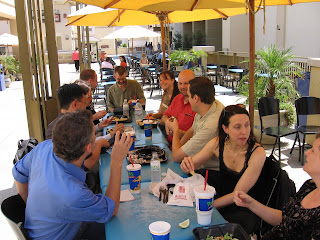
Back at Rubio’s. Steve and Alethia were nice enough to join us,
and Steve continued to impart wisdom over burritos.
After lunch was out long-awaited trip to NASA’s Jet Propulsion Laboratory. I’d been looking forward to this since I’d first read about it on the WOTF Blog. See, not only am I the kind of person to whom a trip to JPL appeals on about nine levels of geekiness, but my WOTF story, “Saturn in G Minor”, is based on findings from the Cassini probe…which was built at JPL.
Now that’s symmetry.
We were driven to JPL in a convoy of cars and British Steve and I ended up in one full of illustrators–my illustrator Randall Ensley, Pasadena native son Marcus Collins, fellow Ukrainian (okay, I’m only 25% Ukrainian, still…) Yuliya Kostyuk, and soon-to-be-Illustrator-Grand-Prize-winner Lorraine Schleter (two guesses why the Steves picked this car to ride in…) The illustrators were a lot of fun and it was nice to get to know some of them a bit better, having been around mostly the other writer winners since Sunday.
Ours was also the most international of the cars in the convoy, I think, for when it came time to show our ID to gain access to JPL we confronted the guard with three American driver’s licenses, and a British, Ukrainian, and Canadian passport.
Assembled in front of the visitor center, we were met by a number of the WOTF judges, including Kevin J. Anderson and Dave Wolverton (aka David Farland), and were checked off the master list of expected guests and given info folders of JPL bumpf…all except me, of course.
See, for some reason, my name wasn’t on the pre-approved list for our tour. Access to JPL is tightly controlled (lest any rogue state steal plans for a probe to Saturn…) and without my name on the list, well, I wasn’t going anywhere…This might have had something to do with the short-notice I had with my passport number (I got it a week-and-a-half earlier) but Joni had given them all that info and couldn’t figure out why I hadn’t been included.
So while everyone else from our group milled about outside, I was at the reception desk trying to talk my way past security.
“No unscreened foreign national is allowed on a tour of the facilities,” said the thick-necked ex-Marine looking fellow behind the security desk.
Foreign national?
“Come on,” I said, trying to sound as just-between-you-and-me as I could, “I’m Canadian. I’m not that foreign. We’re like your cousins. We built the Canadarm for the Space Shuttle–we’re all friends…”
Thick Neck was having none of it.
Andrea pointed out that her husband Mike was on the list but wasn’t arriving until later in the day and that I could pretend to be him. It was a good idea and if I’d been smarter and not already pleaded my “but I’m Canadian” case to Thick Neck I might have tried it. Having identified myself to security, though, I decided not to chance being shipped to Guantanamo Bay.

Back (in red): Steve Savile; Middle (L to R): KD Wentworth, Dave Wolverton aka David Farland, Dave’s wife (whose name I missed…); Front: Kim Zimring and John Burridge
At this point a very kind JPL employee (whose name I wish I could remember) stepped in to help. He tried reasoning with Thick Neck (there wasn’t) to see if there was some way around this requirement (there wasn’t) and what we could do to get me approved pronto. This guy took down my passport info and dashed across the JPL campus to the security office to have them run the numbers and prove to Thick Neck that I wasn’t an enemy combatant.
Photo courtesy Galaxy Press/WOTF
Half an hour later I had my badge and bumpf folder. Take that Thick Neck!
Permission finally obtained, it was time for the tour to commence. And there was much rejoicing. Doesn’t this remind you of the album cover of Sgt. Pepper’s Lonely Hearts Club Band? Given that Damon’s hand is right over my head, I guess that means I’m Paul…
Photo courtesy Galaxy Press/WOTF
The tour itself was wonderful. JPL’s campus is pretty good looking and the toys they have to play with are second to none.
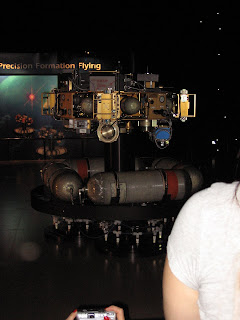
These astronomy robots are part of JPL’s Distributed Spacecraft Technology program. Part of the program’s aim is to create semi-autonomous precision formation flying deep space probes which could work in concert to detect distant stellar pheonmena and planets.

This is the test bed (with steep incline left) where they simulate the Martian surface and test movement scenarios before sending the commands to the rovers on Mars.
By far the coolest (yes, even cooler than the Mars Rover) were the three ATHLETEs–All-Terrain Hex-Legged Extra-Terrestrial Explorer. You can find out more about them here.
Take special note of some of ATHLETE’s abilities:
“Traverse almost any terrain, including vertical rock faces or sandy slopes at the angle of repose by using a launchable/releasable grappling hook” and “Large payload capacity of 450 kg per vehicle, with much more for multiple ATHLETE vehicles docked together.”
This is what Batman would do if he built @#$%ing Voltron!
I wish to apologize to Stanley Schmidt right now, because after seeing this we all started shouting out ideas for stories involving ATHLETE that we could send to Analog. So, Mr. Schmidt–I’m sorry if you suddenly see a dozen stories involving hex-legged robots on the Moon…
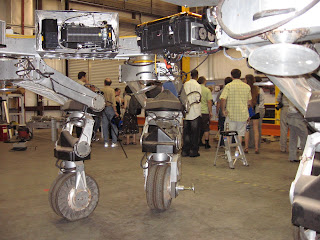
The authors having turned their backs momentarily,
ATHLETE turns to silently stalk its unsuspecting prey…

The ATHLETE can fold its legs up and rest its chassis on the ground.
That’s actual Moon dust on its joints…well, not really.
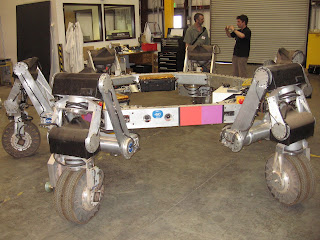
The engineer in this photo told John you could put a soccer ball-like dome on ATHLETE and very easily have a mobile habitat on the Moon which you could program to drive anywhere on the lunar surface while you slept.
“I want one!” said John.
“You trust robots way more than I do,” said the robot engineer.
We were walking around the campus for a couple of hours and it was fantastically hot–JPL is surrounded (as is seemingly everything in southern California) by hills so there was no wind and the merciless day orb (inside joke) beat down on us from the cloudless sky.
As we passed the JPL cafeteria Andrea Kail led us in a water revolt, bless her. Being Canadian I would have suffered in polite silence, but I really admire New Yorkers–they cut through all that crap.
Remember that scene in The Ten Commandments when the Hebrew slaves raid the temple granaries? It was like that with us and the JPL cafeteria, but with bottled water.
– Charlton Heston as Moses
Fully hydrated, we were able to finish our tour.
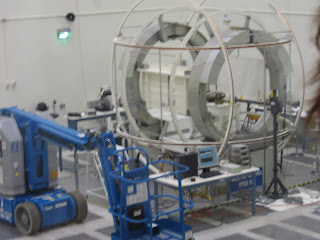
Sorry this photo is blurry–it was taken on the sly. This is NASA’s prototype
time machine and they don’t want people knowing about it…
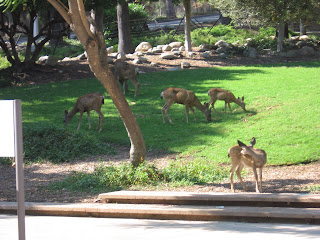
“Deer…in…SPAAACCCCEEEE!” Apparently these deer wander the JPL campus
and can even be fed by hand. Sadly, I’d left my deer feed back at the hotel…
Once back at the hotel it was time for the reveal of the artwork which accompanied our stories in the anthology. We walked into this little room and there were the illustrators, standing by framed prints of the illustrations they’d done based on our stories. The moment was made all the more special knowing that we would be getting those frames prints to keep.
The image that Randall had done for mine was very cool–it was from the beginning of the story and looked way cooler than the visual I had in my mind when I wrote that scene in the story. Thanks for making me look good, Randall 🙂 I’d been wondering since I won in October what scene he would pick–I tend to see scenes quite vividly in my mind as I write and I could think of a number of parts that might have made for good visual storytelling. I like the moment that Randall chose, but you have to give the guy credit: he works in pointalism and chose what had to be one of the most work-intensive s scenes–one set in deep space.
I’ll remind you that space is black and that Randall works in tiny little dots.
Most impressive.
Yuliya shows me her portfolio. “Your face,” she said “reminds
me so much of Ukraine.” I’m not sure exactly what she meant…
Photo courtesy Galaxy Press/WOTF
After the art reveal, the writers returned to our little conference room for a presentation by Kevin J. Anderson and his wife Rebecca Moesta. I’d heard from Steve Savile that this was one of the real highlights of his WOTF experience, and Sean Williams said he always looked forward to hearing the presentation, finding it inspiring and energizing.
I gotta say, I agree.
The presentation was a lot of fun and there was some great advice…but I don’t need to tell you that because you can experience it for yourself! Adventures in Scifi Publishing was there recording the whole thing as a podcast (hence the fancy microphones) and you can hear it for yourself here.
After that Charles Brown, the editor of Locus and this year’s recipient of the Hubbard Lifetime Achievement Award, spoke to us about SF as a family and I think he has a funny (and often incriminating) story about nearly everyone who is anyone in SF.
He also spoke to us a bit about what it takes to succeed in the industry.
“Most of you will fail. Most of you won’t make it,” he said, to some nervous chuckling from the writers.
In talking about this later with people, what Charles said had clearly shocked and frightened some. All week we’d been hearing positive, supportive, reinforcing messages…and this wasn’t any of those.
Sean Williams and Steve Savile later told me that reactions amongst their cohorts had been the same, with many people shocked by what Charles had to say. They said we’d actually had kind of a gentle version of his usual speech–perhaps he was tempering things this year given his impending award.
While this continued to trouble some over the next few days, others (myself included) were able not to dismiss it but, in essence, be determined that we’d prove Charles wrong.
I’d heard Harlan Ellison give this same warning years ago on the old show Prisoners of Gravity. They’d done a whole episode on what it takes to become a SF writer, including a ten-point list of traits you needed (which I wrote down and pinned to my bedroom wall when I was eleven). Ellison’s advice was that anyone who can be dissuaded from becoming a writer should be dissuaded, as it’s hard, lonely work, and most who attempt it fail.
Since I heard that at age eleven and it hasn’t stopped me in the last seventeen years, I don’t think it’s going to stop me now.
The point I remember most from that ten-point list is “Make sure you need to be a writer. If you can be happy doing anything else, do that instead.” For a long time I wasn’t sure that I had that kind of need, but as I get older and have tried a lot of what else I thought might be my passion–grad school, working for a living, etc.–I find the one thing I keep coming back to is writing. And as Kevin Anderson, Rob Sawyer, and others have told me, it’s often the most persistent writer that succeeds in fiction.
So there’s some hope for me, I guess 🙂
After Charles finished his talk it was time for the barbeque…the “barbecue.” I gather this hotel didn’t have an outdoor BBQ facility (i.e.: an actual barbeque) so we had a faux BBQ in their normal banquet hall. But the food was hardly the point. As it was made clear to us, the point of the BBQ was to meet the judges and schmooze, network, whatever you want to call it.
I grabbed a seat at Aliette and British Steve’s table. We were joined by Charles Brown, Steve Savile, Alethea Kontis, and Sean Williams, who I managed to sit next to.
Sean asked me about my writing and whether I was working on a novel. I confessed that I was intimidated by the idea of a novel and was unsure whether I had any novel length ideas. He said when he’d come to the WOTF as a winner back in the early 1990s he’d been in the same boat, and he recommended William Goldman’s Adventures in the Screen Trade as a good guide (though it’s about screen writing, it talks a great deal about plotting, drama, storytelling, character, etc.)
Sean explained his 10 ½ Commandments for Writing, but the best piece of advice he gave me was to be aware of your technique as you write–if you’re aware of what you’re trying to do as you write and you get stuck, you can more easily figure out why you’re stuck and get yourself out.
Sean’s advice put words to something that had been itching the back of my mind since Monday. Before I went to WOTF I’d been a very intuitive writer, just writing and seeing what happened and where the story took me. If a scene had some kind of emotional resonance or the story some kind of overarching theme I must confess it was accidental. If I noted it when I started doing revisions I’d maybe try to beef it up a bit, but it was often a surprise to me.
But when I got stuck I was stuck. And it wasn’t writers’ block (I don’t believe there’s such a thing) but that while I knew there was a problem I could see no solution or way out.
Both Tim and Kathy–who had largely divergent styles of plotting and writing–each clearly had an awareness of what they were trying to accomplish in plot motion, stage setting, and emotional content of each scene more or less as they wrote. Tim said he worried about theme later on, and I have no doubt that they polished and honed as they reworked in later drafts, but a fundamental difference between the pros and me was that they were conscious of what they were doing (or at least attempting) as they were doing it.
That kind of self-awareness as a writer is something I need to strive for from now on. No doubt it will become easier with time and practice.
After dinner I took the opportunity to introduce myself to Kevin J. Anderson and thank him for the talk he and Rebecca gave. He seemed surprised that I remembered his Gamearth Trilogy of the late 1980s-early 1990s and genuinely stunned when I told him that was the first trilogy I’d ever read as a kid–and it’s true. I read and loved the Gamearth books before I finished the Lord of the Rings (I got halfway through The Two Towers and, being an easily bored nine-year-old, put it down and didn’t pick it up again until high school), the original Dune books, or the Foundation trilogy.
(I’d even worked out a RPG based on the Gamearth books, but got upset when my friends didn’t play along the storyline of the books…but I digress).
Turns out Kevin and Rob Sawyer are friends and had each broken into the business around the same time, so I was able to talk to Kevin about Rob for a while. He then said he and a few people were going for drinks after the BBQ broke up and asked if I’d like to come along.
Hmm… New York Times bestselling sci-fi author asks whether I’d like a drink… Guess what I said?
So having a few minutes before we were to leave I decided I’d chickened out long enough and, taking my copy of Under Cover of Darkness in hand, walked over to Larry Niven.
Yeah. Larry Niven.
Now, I’d seen him interviewed plenty of times on Prisoners of Gravity (which, growing up in Kingston as the only SF fan I knew, was kind of my lifeline to the world of people who I could look at and say: “Hey–these people like the same stuff I do…”)
But he’s LARRY freaking NIVEN.
Ringworld—Mote in God’s Eye–Grand Master–Living Legend–Larry Niven.
It had taken me about and hour and a half to screw up the courage to talk to Larry Niven, and it took me less than forty seconds to completely blow my first meeting with him.
Here follows what I affectionately term the Niven Disaster. But I would like it noted for the record that it was nothing Mr. Niven did or didn’t do, but rather entirely my fault that our first meeting went south, and quickly at that.
I sidled up to the group where Larry Niven was standing (I believe Kim and Andrea were there) and very sheepishly proffered my hand.
Now, I realize in retrospect that when I’m nervous I not only am at a loss for words (being paralyzed by hyper-awareness of my own awkwardness, likely blowing it out of proportion–this came into play the next day when I won the Grand Prize) but I tend to speak quietly.
I learned later from others like Sean Williams, and Kevin Anderson, and Rob Sawyer and his wife Caroline, that Larry Niven is the sweetest, most gentle person you’d ever have the pleasure of meeting. But he’s apparently also quite shy and somewhat hard of hearing.
See where this is going yet?
Here’s how it played out in my mind, in real-time:
“Mr. Niven,” I say, “my name is Stephen Kotowych–I’m one of the writer winners.”
He gives me a look that said: “Why is he bothering me?”
Oh God, I think. He hates me.
I hold out my copy of Under Cover of Darkness. “Would you mind signing this for me?”
He raises an eyebrow. “Do you have a pen?”
I offer the one I’d taken from my hotel room–the complimentary, cheap-as-hell, piece-of-crap pen from the hotel room. I blame the nerves for my not thinking straight.
“Here you are,” I say.
Larry Niven takes the book and the crappy pen, and searches for his story.
“You know,” I say, having geared up for this oh-so-perfect ice breaker for months, “I’m in this book with you.”
Niven says nothing.
Oh God, I think. He doesn’t care. He’s Larry freaking Niven! Of course he wouldn’t care. Who am I–lowly worm!–to expect attention or appreciation from the Master himself?
Niven finds his story in the book and starts to write.
Or rather he tries to write. For the pen, that complimentary, cheap-as-hell, piece-of-crap pen from the hotel room isn’t writing anything.
“We’re not off to a good start,” he says, looking exasperated and handing the pen back to me.
I’m three inches tall at this point. The look on Larry Niven’s face says: “Who is this idiot and why is he bothering me?”
I scribble madly on the title page of the book, a near-by table cloth, and then on the back of my hand nearly rubbing through the skin until at last, mercifully, the pen works.
I hand it back to him and try to smile. He finally manages to sign the book and hands it back to me.
Offering my thanks, I slink away to commit seppuku. I’m in desperate need of that drink Kevin offered–I’m only glad I spoke to him first, as I don’t think I would have had the courage to introduce myself to him cold now.
Though I have my signature, I regret having bothered Niven, and know I will never forget the shame and embarrassment of my first meeting with him.
So that’s how I thought it played out. After talking with some people and trying to reconstruct events in my mind here’s a closer approximation of how things actually went:
I sidle up to Larry Niven and, shoulders hunched, offer my hand, which he shakes.
I mumble something which is barely audible, even to me. Had we the subsonic hearing abilities of elephants, we might have made out the words: “Mr. Niven, my name is Stephen Kotowych–I’m one of the writer winners.”
Larry Niven, shy about being approached by a stranger (as I would be as well) looks at me and thinks: Did he say something?
Suddenly a copy of Under Cover of Darkness is thrust toward him and there’s some more subsonic muttering.
Niven raises a confused and expectant eyebrow. What did he say? Niven wonders. My hearing isn’t so good–did he say anything at all? Nervous Guy’s lips seem to be moving a little… He’s a pro, though, and been around a long time–he realizes that this painfully nervous mumbling fellow seeks an autograph. Happy to sign, Niven asks: “Do you have a pen?”
The mumbler shoves a pen into Niven’s hand, and the Grand Master looks for his story in the book, not noticing–how could he without looking directly at the mumbler’s lips to see them move?–that the fellow has said something else. If he were to review a security camera tape of the scene later, Niven might be able to make out the words on the young man’s lips: “You know, I’m in this book with you.”
Trying to write, Niven finds that the pen doesn’t work.
To break the tension and put the young man at ease Niven jokes: “We’re not off to a good start.” He smiles and hands the pen back to the stricken-faced young man who proceeds to scratch the pen furiously on every nearby surface until ink starts to flow.
The mumbler hands the pen back to Niven with a twisted rictus on his face. Niven signs the book, and the young man makes some awkward motions before he runs–not walks–away, nearly knocking several people over in the process.
So my only real hope is that, should I ever get a chance to meet Larry Niven again, he won’t remember who I am and we can laugh as I recount watching that hopeless young man ask for his autograph that time…and I’ll claim that hopeless young man was one of the illustrator winners.
Staggering around, stunned, at this point I was greeted by Dave Wolverton, who was extremely nice and very friendly. He asked where I was from and then recounted how he himself had almost been Canadian (his family nearly moved to Canada at one point). He asked me how I was feeling about the Grand Prize and I was honest with him: I said I was scared to win and scared to lose.
After this we were off to the pub. It ended up being Kevin Anderson, Swedish Steve, Alethea, British Steve, and myself. I think Sean Williams was supposed to come, but he was still dealing with the jet lag and the flu.
I don’t think I managed to say much during the evening (except to recount the Niven Disaster–which I was assured by Kevin couldn’t possibly have been that bad because Niven is really sweet, but shy and a bit hard of hearing…)
I sat mostly in rapt attention as Swedish Steve and Kevin talked about the industry, agents, editors, media tie-ins, the WOTF contest, writing, and editing (Steve and Alethea co-edited the 2006 science fiction and fantasy anthology Elemental, a benefit anthology for children who survived the 2004 Indian Ocean tsunami that includes work by Arthur C. Clarke, Brian Aldiss, David Drake, Jacqueline Carey, Martha Wells, Larry Niven, Joe Haldeman, Eric Nylund, Sherrilyn Kenyon (writing as Kinley MacGregor), Stel Pavlou, Michael Marshall Smith, Sean Williams, Nina Kiriki Hoffman, Brian Herbert & Kevin J. Anderson, and others.)
It was a fabulous experience and I was floored by the things I was hearing (some of this was clearly industry insider gossip that was just fascinating) and I remain grateful to Kevin for the invite.
We decided to walk back to the hotel (which wasn’t far and the night was beautiful, as doubtless many California nights are) but in the process we almost lost Kevin to the Palm Tree of Death.
See, the streets in Pasadena are lined with palm trees but the planters are actually sunken below the level of the sidewalk. Consequently, they have these decorative metal grates covering the top of the planter, making them level with the sidewalks.
But as we were walking and talking (and not looking at our feet) none of us noticed that one of the palm trees had recently been removed, along with its grate. There was, therefore, essentially a six-foot by six-foot eight-inch deep unmarked hole jutting out into the middle of this dark sidewalk in downtown Pasadena.
Kevin was one moment recounting a story and the next falling into this seemingly endless hole. It happened too fast for any of us to catch him or anything, but his recovery was one of the most impressive self-catches I’ve seen. He ended up with a scrapped knee, but I think it could have gone much worse given the size of the hole and how unexpected it was. And if it hadn’t been him (he was out front, being an avid hiker and thus very fast on level ground) I’m sure one or another of us would have taken a spill.
Luckily none of us had to go back to the hotel and explain to the contest or his wife how Kevin Anderson, New York Times bestselling sci-fi author, had been killed in a bizarre palm tree accident.
Having had enough excitement for one day, I retired to my room when we got back to the Sheraton. Tomorrow was the award ceremony which I knew would run into the wee hours, and since we were free until 1030am I decided to let myself sleep in for the first time that week…
– S.
=-=-=-=-=-=-=-=-=-=-=-=-=-=-=-=-=
TOMORROW: Friday
– The Day of Days
– “I Feel Pretty”
– “This Isn’t About Saving the Whales”
– The reason why I studied the HISTORY of science and not actual science
– And the winner is…

















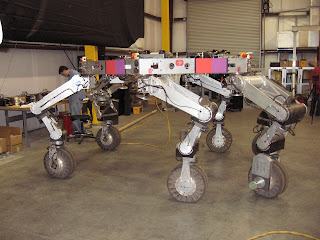
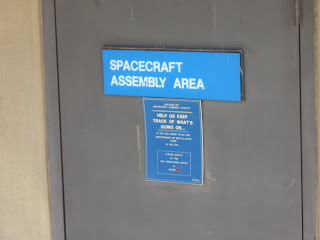





Stephen this is awesome. Great pics! Brings back memories…
See you soon!
I was linked here via Tony Pi’s LJ, and I’m thoroughly enjoying reading about this experience. And I’m simultaneously excited and terrified about going through the same thing myself if I ever place.